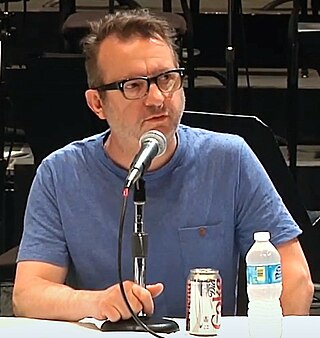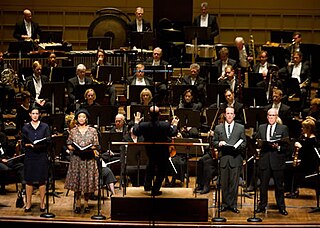Related Research Articles

Mark-Anthony Turnage is an English composer of contemporary classical music.
John Harris Harbison is an American composer and academic.

Steven Edward Stucky was a Pulitzer Prize-winning American composer.
Bernard Rands is a British-American contemporary classical composer. He studied music and English literature at the University of Wales, Bangor, and composition with Pierre Boulez and Bruno Maderna in Darmstadt, Germany, and with Luigi Dallapiccola and Luciano Berio in Milan, Italy. He held residencies at Princeton University, the University of Illinois, and the University of York before emigrating to the United States in 1975; he became a U.S. citizen in 1983. In 1984, Rands's Canti del Sole, premiered by Paul Sperry, Zubin Mehta, and the New York Philharmonic, won the Pulitzer Prize for Music. He has since taught at the University of California, San Diego, the Juilliard School, Yale University, and Boston University. From 1988 to 2005 he taught at Harvard University, where he is Walter Bigelow Rosen Professor of Music Emeritus.

Augusta Read Thomas is an American composer and University Professor of Composition in the Department of Music at the University of Chicago, where she is also director of the Chicago Center for Contemporary Composition.
Daniel Steven Crafts is an American composer. He was born in Detroit, Michigan, but has spent most of his life in the San Francisco Bay Area.
Hendrik Pienaar Hofmeyr is a South African composer. Born in Cape Town, he furthered his studies in Italy during 10 years of self-imposed exile as a conscientious objector. While there, he won the South African Opera Competition with The Fall of the House of Usher. He also received the annual Nederburg Prize for Opera for this work subsequent to its performance at the State Theatre in Pretoria in 1988. In the same year, he obtained first prize in an international competition in Italy with music for a short film by Wim Wenders. He returned to South Africa in 1992, and in 1997 won two major international composition competitions, the Queen Elisabeth Music Competition of Belgium and the first edition of the Dimitris Mitropoulos Competition in Athens. His 'Incantesimo' for solo flute was selected to represent South Africa at the ISCM World Music Days in Croatia in 2005. In 2008 he was honoured with a Kanna award by the Kleinkaroo National Arts Festival. He is currently Professor and Head of Composition and Theory at the South African College of Music at the University of Cape Town, where he obtained a DMus in 1999.
Raymond Wilding-White ; was an American composer of contemporary classical music and electronic music, and a photographer/digital artist.
Robert Comrie Turner, was a Canadian composer, radio producer, and music educator. He graduated with a bachelor's degree in music from McGill University in 1943. While there he studied with Douglas Clarke and Claude Champagne. He continued his studies briefly at Colorado College in 1947, where he met his wife, percussionist Sara Scott. They married in 1949. In 1947, Turner transferred to Peabody College in Nashville, Tennessee, where he studied with Roy Harris. He graduated in 1950 with a master's degree. During this time, Turner spent two summers studying with Herbert Howells and Gordon Jacob at the Royal College of Music and one summer at the Berkshire Music Center at Tanglewood studying with Olivier Messiaen. He returned to McGill University in 1951, graduating with a doctorate two years later.
Daniel Felsenfeld is a composer of contemporary classical music and a writer.
William Mayer was an American composer, best known for his prize-winning opera A Death in the Family.

Mark Carlson is an American composer, flutist, UCLA professor, and the founder and artistic director of the chamber music ensemble Pacific Serenades.

Janet Maguire is an American composer who was born in Chicago and resides in Venice, Italy.
Ivan Fedele is an Italian composer. He studied at the Milan Conservatory.
References
- ↑ "University of California at Berkeley, profile". Archived from the original on 2012-08-11. Retrieved 2013-08-07.
- ↑ Randel, Don (1996). Harvard Biographical Dictionary of Music . Harvard University Press. pp. 831. ISBN 0674372999.
- ↑ Rosenfeld, Jeff. "Playing with Expectations". San Francisco Classical Voice. Archived from the original on 2013-12-15. Retrieved Oct 19, 2004.
- ↑ Commanday, Robert (April 25, 1991). "Baritone Strikes Gold for Himself". San Francisco Chronicle.
- ↑ Ulrich, Allan (July 2009). Opera: 845.
{{cite journal}}: CS1 maint: untitled periodical (link) - ↑ Busse, Thomas. "Here Comes the Dawn". San Francisco Classical Voice. Retrieved 10 February 2009.
- ↑ Kosman, Joshua, "Opera Review: 'Middlemarch in Spring' is a Sunny Romp,", San Francisco Chronicle , March 21, 2015
- ↑ Gereben, Janos, "Middlemarch--literature's gift to opera," San Francisco Examiner, March 20, 2015
- ↑ "Einstein at Princeton - Victor Cordell - Berkshire Fine Arts".